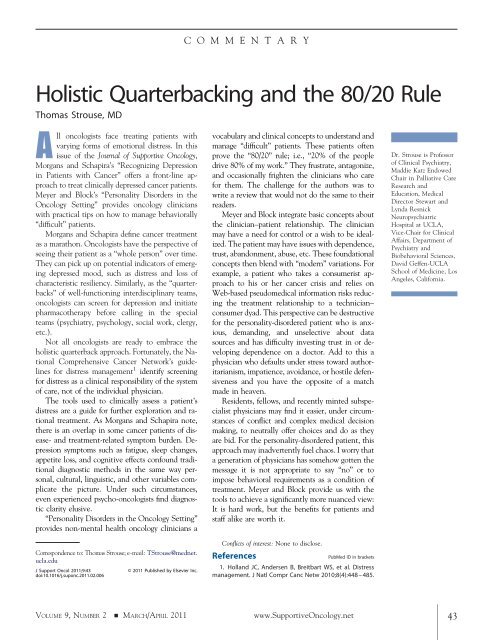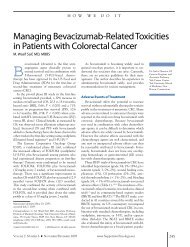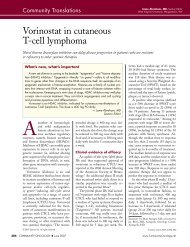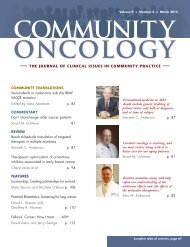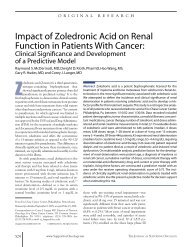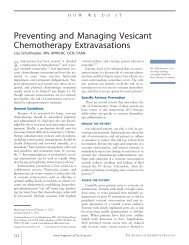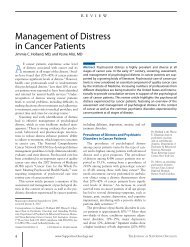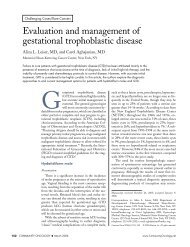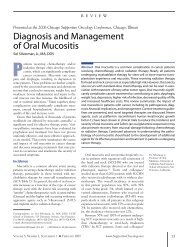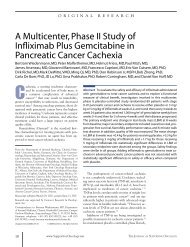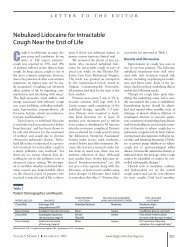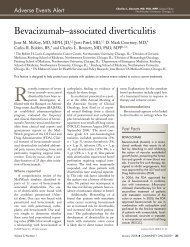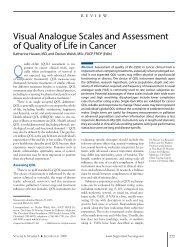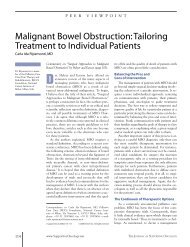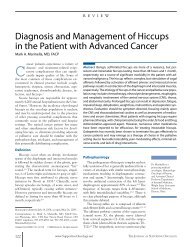Evaluating the “Good Death” Concept from Iranian Bereaved Family
Evaluating the “Good Death” Concept from Iranian Bereaved Family
Evaluating the “Good Death” Concept from Iranian Bereaved Family
Create successful ePaper yourself
Turn your PDF publications into a flip-book with our unique Google optimized e-Paper software.
C O M M E N T A R Y<br />
Holistic Quarterbacking and <strong>the</strong> 80/20 Rule<br />
Thomas Strouse, MD<br />
All oncologists face treating patients with<br />
varying forms of emotional distress. In this<br />
issue of <strong>the</strong> Journal of Supportive Oncology,<br />
Morgans and Schapira’s “Recognizing Depression<br />
in Patients with Cancer” offers a front-line approach<br />
to treat clinically depressed cancer patients.<br />
Meyer and Block’s “Personality Disorders in <strong>the</strong><br />
Oncology Setting” provides oncology clinicians<br />
with practical tips on how to manage behaviorally<br />
“difficult” patients.<br />
Morgans and Schapira define cancer treatment<br />
as a marathon. Oncologists have <strong>the</strong> perspective of<br />
seeing <strong>the</strong>ir patient as a “whole person” over time.<br />
They can pick up on potential indicators of emerging<br />
depressed mood, such as distress and loss of<br />
characteristic resiliency. Similarly, as <strong>the</strong> “quarterbacks”<br />
of well-functioning interdisciplinary teams,<br />
oncologists can screen for depression and initiate<br />
pharmaco<strong>the</strong>rapy before calling in <strong>the</strong> special<br />
teams (psychiatry, psychology, social work, clergy,<br />
etc.).<br />
Not all oncologists are ready to embrace <strong>the</strong><br />
holistic quarterback approach. Fortunately, <strong>the</strong> National<br />
Comprehensive Cancer Network’s guidelines<br />
for distress management 1 identify screening<br />
for distress as a clinical responsibility of <strong>the</strong> system<br />
of care, not of <strong>the</strong> individual physician.<br />
The tools used to clinically assess a patient’s<br />
distress are a guide for fur<strong>the</strong>r exploration and rational<br />
treatment. As Morgans and Schapira note,<br />
<strong>the</strong>re is an overlap in some cancer patients of disease-<br />
and treatment-related symptom burden. Depression<br />
symptoms such as fatigue, sleep changes,<br />
appetite loss, and cognitive effects confound traditional<br />
diagnostic methods in <strong>the</strong> same way personal,<br />
cultural, linguistic, and o<strong>the</strong>r variables complicate<br />
<strong>the</strong> picture. Under such circumstances,<br />
even experienced psycho-oncologists find diagnostic<br />
clarity elusive.<br />
“Personality Disorders in <strong>the</strong> Oncology Setting”<br />
provides non-mental health oncology clinicians a<br />
Correspondence to: Thomas Strouse; e-mail: TStrouse@mednet.<br />
ucla.edu<br />
J Support Oncol 2011;9:43 © 2011 Published by Elsevier Inc.<br />
doi:10.1016/j.suponc.2011.02.006<br />
vocabulary and clinical concepts to understand and<br />
manage “difficult” patients. These patients often<br />
prove <strong>the</strong> “80/20” rule; i.e., “20% of <strong>the</strong> people<br />
drive 80% of my work.” They frustrate, antagonize,<br />
and occasionally frighten <strong>the</strong> clinicians who care<br />
for <strong>the</strong>m. The challenge for <strong>the</strong> authors was to<br />
write a review that would not do <strong>the</strong> same to <strong>the</strong>ir<br />
readers.<br />
Meyer and Block integrate basic concepts about<br />
<strong>the</strong> clinician–patient relationship. The clinician<br />
may have a need for control or a wish to be idealized.<br />
The patient may have issues with dependence,<br />
trust, abandonment, abuse, etc. These foundational<br />
concepts <strong>the</strong>n blend with “modern” variations. For<br />
example, a patient who takes a consumerist approach<br />
to his or her cancer crisis and relies on<br />
Web-based pseudomedical information risks reducing<br />
<strong>the</strong> treatment relationship to a technician–<br />
consumer dyad. This perspective can be destructive<br />
for <strong>the</strong> personality-disordered patient who is anxious,<br />
demanding, and unselective about data<br />
sources and has difficulty investing trust in or developing<br />
dependence on a doctor. Add to this a<br />
physician who defaults under stress toward authoritarianism,<br />
impatience, avoidance, or hostile defensiveness<br />
and you have <strong>the</strong> opposite of a match<br />
made in heaven.<br />
Residents, fellows, and recently minted subspecialist<br />
physicians may find it easier, under circumstances<br />
of conflict and complex medical decision<br />
making, to neutrally offer choices and do as <strong>the</strong>y<br />
are bid. For <strong>the</strong> personality-disordered patient, this<br />
approach may inadvertently fuel chaos. I worry that<br />
a generation of physicians has somehow gotten <strong>the</strong><br />
message it is not appropriate to say “no” or to<br />
impose behavioral requirements as a condition of<br />
treatment. Meyer and Block provide us with <strong>the</strong><br />
tools to achieve a significantly more nuanced view:<br />
It is hard work, but <strong>the</strong> benefits for patients and<br />
staff alike are worth it.<br />
Conflicts of interest: None to disclose.<br />
References PubMed ID in brackets<br />
1. Holland JC, Andersen B, Breitbart WS, et al. Distress<br />
management. J Natl Compr Canc Netw 2010;8(4):448–485.<br />
Dr. Strouse is Professor<br />
of Clinical Psychiatry,<br />
Maddie Katz Endowed<br />
Chair in Palliative Care<br />
Research and<br />
Education, Medical<br />
Director Stewart and<br />
Lynda Resnick<br />
Neuropsychiatric<br />
Hospital at UCLA,<br />
Vice-Chair for Clinical<br />
Affairs, Department of<br />
Psychiatry and<br />
Biobehavioral Sciences,<br />
David Geffen-UCLA<br />
School of Medicine, Los<br />
Angeles, California.<br />
VOLUME 9, NUMBER 2 � MARCH/APRIL 2011 www.SupportiveOncology.net 43


